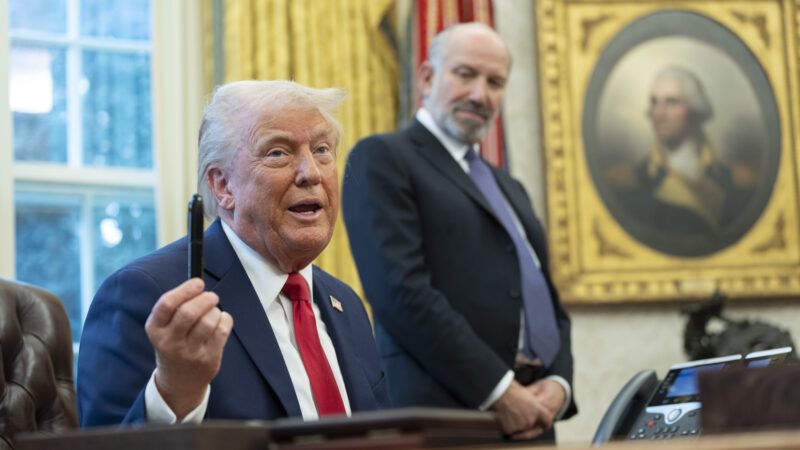Forget Obama: Trump's Pen and Phone Are Bigger Even Than FDR's
The president is on a record-shattering pace for executive actions.

On Monday, President Donald Trump signed executive orders federalizing law enforcement in the District of Columbia and lengthening the suspension of threatened tariffs on China by three months. They were the 187th and 188th executive orders of Trump's second term, on just its 203rd day.
That's more executive orders than predecessor Joe Biden issued in his entire presidency, 162. It's also more than George H.W. Bush (166), Gerald Ford (169), and 24 of the first 25 presidents. (Ulysses S. Grant, with his 217 over eight years, will likely be eclipsed by Trump's 2025 totals this fall.) Neither the famously power-expanding George W. Bush, nor Barack Obama of the notorious "pen and phone," signed as many as 188 executive orders in any of their combined four terms.
The only American president to compete with the size of Trump's second-term pen was the man whose energetic aggrandizement of the executive branch inspired generations of conservative and libertarian opposition: Franklin Delano Roosevelt. That a MAGA Republican is competing on process with the ultimate progressive Democrat is an indicator of just how radically Trump has reshaped the ideology of the GOP.
FDR averaged 307 E.O.s per year across his 12 years in office, fewer than Trump 2.0's annualized rate of 342. But in the "bold, persistent experimentation" and legal power-grabbing of his Depression-wracked first term, Roosevelt tipped the scales at 440 orders per year.
There are, however, more ways to unleash the executive. Presidents, particularly of modern vintage, can also issue proclamations, memoranda, notices, and determinations, ranging from the purely symbolic to the stealthily momentous. (Recall that Obama's Deferred Action for Childhood Arrivals, essentially immunizing minor illegal immigrants from enforcement, was issued not as a law, but a Department of Homeland Security memorandum.) On those combined types of presidential actions, Trump in his first 100 days more than doubled up on FDR, 227 to 103 (Biden came in second among the first 100 days of presidents this past century, at 106).
The move toward federal government by presidential fiat comes as a transformation not just of Republican orthodoxy, but of Trump's own prior statements and actions.
At a campaign event in February 2016, the GOP front-runner complained that "the country wasn't based on executive orders….Right now, Obama goes around signing executive orders. He can't even get along with the Democrats, and he goes around signing all these executive orders. It's a basic disaster. You can't do it." The next month, he vowed: "I want to not use too many executive orders, folks. Executive orders sort of came about more recently. Nobody ever heard of an executive order. Then all of a sudden Obama, because he couldn't get anybody to agree with him, he starts signing them like they're butter. So I want to do away with executive orders for the most part."
The 2016 Republican Party Platform decried executive-branch overreach, starting a multiparagraph section on the subject with the declaration that "Our Constitution is in crisis." More:
The current Administration has exceeded its constitutional authority, brazenly and flagrantly violated the separation of powers, sought to divide America into groups and turn citizen against citizen. The President has refused to defend or enforce laws he does not like, used executive orders to enact national policies in areas constitutionally reserved solely to Congress, made unconstitutional "recess" appointments to Senate-confirmed positions, directed regulatory agencies to overstep their statutory authority, and failed to consult Congress regarding military action overseas. He has changed what John Adams called "a government of laws and not of men" into just the opposite.…
Our most urgent task as a Party is to restore the American people's faith in their government by electing a president who will enforce duly enacted laws, honor constitutional limits on executive authority, and return credibility to the Oval Office. We need a Republican president who will end abuses of power by departments and agencies, like the IRS and the EPA, and by the White House itself. Safeguarding our liberties requires a president who will respect the Constitution's separation of powers, including the authority of Congress to write legislation and define agency authority.
Trump in his first term governed at least partly on those principles, particularly when it came to trimming back regulatory overreach. He issued a total of 220 executive orders from 2017–2021, a rate right in line with the presidential record from Dwight Eisenhower to Barack Obama. What's interesting is how much he, and the rest of the party, have come to view the imperial presidency as a feature, not a bug.
The 2024 GOP platform, which admittedly didn't contain very much compared to previous cycles, was silent on executive power-grabbing. The more expansive Project 2025 governing blueprint by the once executive-skeptical Heritage Foundation uses the phrase "executive order" a whopping 169 times, mostly as recommendations for new ones. Only once in the entire document—Lindsey M. Burke's education chapter—does the old-timey faith make an appearance: "[Stop] executive overreach. Congress should set policy—not Presidents through pen-and-phone executive orders, and not agencies through regulations and guidance. National emergency declarations should expire absent express congressional authorization within 60 days after the date of the declaration."
Instead of anything like that, we have an administration inventing globe-reshaping tariff policies based on quarter-assed emergency declarations; deciding capriciously whether or not to enforce duly passed congressional legislation; and wielding comically large pens for Oval Office photo ops.
You can almost hear the sense of relief among conservatives when Trump's latest gambit otherwise lines up directionally with their policy preferences, and against the desires of Democrats and the media. It is certainly more comfortable to mock the furious bleating on the opposing side, than notice that your own has abandoned the constitutional separation of powers.
